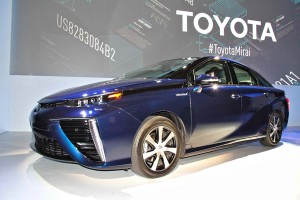In an unusual – but not entirely unprecedented – move, Toyota officials announced they will give free access to nearly 6,000 different patents covering advanced fuel cell technology to the company’s competitors.
The announcement, made during a news conference at the annual Consumer Electronics Show in Las Vegas, comes as Toyota begins production of its new Mirai hydrogen fuel cell vehicle. Though the Japanese giant was an early pioneer in the use of hybrid powertrain technology it has largely turned its corporate back on more advanced electric vehicles, betting that hydrogen provides a better way to meet the need for zero-emissions vehicles.
“We think (hydrogen) will solve a lot of problems associated with electric vehicles,” such as limited range and long recharging times, said Bob Carter, Senior Vice President of Automotive Operations for Toyota Motor Sales USA.
The new Toyota Mirai will deliver as 300 miles on a tank of compressed hydrogen, about triple the range of the lithium-ion-powered Toyota RAV4-EV, and filling up will take about five minutes, a fraction of the time needed to recharge batteries.
That’s not to say there aren’t problems with hydrogen power. The Mirai will be even more expensive than many comparable battery cars, Toyota planning to charge $57,000 for the futuristic looking sedan when it goes on sale in the U.S. later this year.
(Click Here to find out why Honda delayed the launch of its FCV hydrogen car.)
The bigger issue is the lack of a hydrogen refueling infrastructure. While there are electric outlets everywhere – if not high-speed chargers – there currently are only a handle of places where a Mirai could be refueled, almost all of those in Southern California.
It’s a classic “chicken-and-egg” problem, according to Carter, with the energy industry reluctant to invest in hydrogen production and distribution unless and until there’s enough of a base of users. California lawmakers have set aside funds that could create a statewide network of hydrogen pumps, and Toyota – as well as competitor Honda Motor Co. – is investing its own cash to help set up still more outlets for the lightweight gaseous fuel.
(Affordable hydrogen could send fuel-cell sales soaring, says new study. Click Here for more.)
The need to reach the tipping point, with enough fuel-cell vehicles on the road to make the technology viable, is why Toyota decided to license for free an estimated 5,680 patents covering fuel-cell vehicle technology, along with another 70 for refueling stations.
“We think it’s more important” to promote the growth of hydrogen power “than the recovery of our investment dollars,” explained Carter.
That strategy isn’t entirely unique. Last year, Tesla Motors founder and CEO Elon Musk said his company would open up the licenses of its own electric vehicle patents in a bid to spur the growth of the electric vehicle market.
Getting a refueling infrastructure in place is a potentially long-term challenge for hydrogen proponents. But there’s a more immediate issue: the plunge in the price of gasoline has had a significant, negative impact on demand for all forms of alternative propulsion. Even the hugely popular Toyota Prius hybrid has suffered a slide in sales.
Demand for high-mileage and alternative power is always higher “when gas is approaching $5 a gallon,” said Carter, but he stressed that the need to find alternatives to petroleum can’t be dismissed because of cheap oil.
“This isn’t a six month issue, it’s a 100-year issue,” he argued, adding that Toyota is convinced there will be significant demand for hydrogen vehicles in the U.S. by the end of the decade.
Along with Toyota, Honda plans to launch its own fuel-cell vehicle, the FCV, in 2016. Hyundai introduced a hydrogen version of its own Tucson model in mid-2014. Mercedes-Benz and General Motors are among the other manufacturers also expected to enter the market this decade.
(Conventional gas-powered cars could be in the minority by 2017. Click Here for details.)


I would expect nothing less from Toyota. A very good move.
I doubt that most people buying EVs are doing so to save costs on fuel as the TCO for these vehicles is typically far greater than any cost savings. People buying EVs are predominantly those who think they are saving the planet or those who like cool new tech.
Hydrogen powered cars seem to have a more certain future IMO and I suspect it will be a lot easier to get filling outlets established than recharging stations. Numerous petrol stations in Germany sell gas, Diesel, propane and CNG so adding hydrogen is a no brainer if there is demand.
Society should not be funding recharging or hydrogen filling stations. They didn’t fund gas stations and they shouldn’t subsidize those who chose to dabble in advanced tech when clean Diesel is still the best high mpg choice.
If the EV and hydrogen car makers want to sell their specialty cars, make deals with the utility companies and hydrogen suppliers to build refueling stations. Then it’s a win-win for all involved in the technology and tax payers aren’t fleeced like usual..